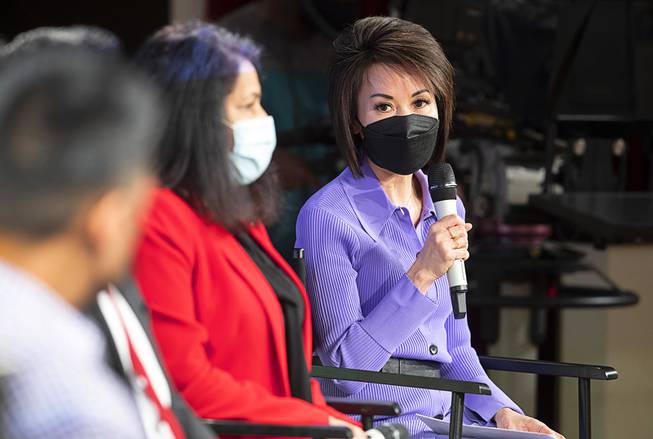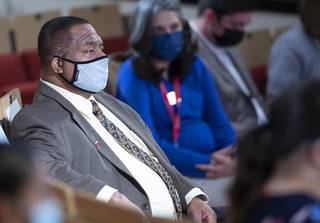
Nevada first lady Kathy Sisolak speaks Wednesday, Nov. 3, 2021, during a panel discussion addressing discrimination against Asian Americans and Pacific Islanders.
Friday, Nov. 5, 2021 | 2 a.m.
The hate speech directed at Nevada first lady Kathy Sisolak happened a few months ago and she’s still hurt.
Sisolak detailed when a Nye County official made racial remarks about her, alleging that her family in China was making money from the COVID-19 pandemic and therefore Gov. Steve Sisolak’s promotion of mask wearing was a conflict of interest.
“What hurt me the most, or what affected me the most, was who and where they came from,” Sisolak said Wednesday during a panel discussion at UNLV. “They came from an elected official in a formal meeting discussing mandates to keep our family, our community and our state safe.”
Sisolak was part of a UNLV series called “We Need to Talk About AAPI Inclusion” — a second part in a discussion addressing discrimination against Asian Americans and Pacific Islanders.
“Although those recent events hurt me, they don’t hurt just me,” she continued. “I think they hurt everyone. What the pandemic has shown is that it’s really been a part of the bigger societal problem. I think the governor and I are committed to working with our communities, to make sure Nevada is a warm and welcoming place for all.”
Su Kim Chung, one of the organizers of the event and head of public services and special collections archives at UNLV, said the panel series started as a means of addressing structural racism after George Floyd was killed in June 2020 in Minneapolis.
After seeing a rise in anti-Asian hate during the pandemic, Chung and other organizers wanted to address hate against Asian Americans and changes that need to be made.
Stop AAPI Hate released a national report in August covering more than 9,000 hate incident reports filed with the organization from March 19, 2020, to June 30, 2021, including a spike of more than 2,400 incidents that occurred from April to June of this year.
Verbal harassment made up 63.7% of the incidents, and shunning — the deliberate avoidance of Asian Americans and Pacific Islanders — made up 16.5%. Physical assaults comprised 13.7% of the incidents, according to the report.
In March, six people of Asian descent were killed in Atlanta at massage businesses, and there have been many news reports of people of Asian descent getting attacked, hit or shoved.
“There’s underlying issues that need to be addressed,” Radhika Kunnel, co-founder of the South Asian Women’s Alliance, said at the panel.
Jean Munson, program coordinator for National Education for Women’s Leadership in Nevada, said those events of anti-Asian hate have left her in “episodes of being jaded, in episodes of being burned out and episodes of hope.”
The panelists called for more support services being offered in languages particular to an Asian community and creating a mentorship program between Asian Americans for support.
Another solution, panelists said, is an increase in civic participation from Asian Americans and Pacific Islanders.
“Those lived experiences and the things that are talked about in advocacy and leadership are reflected in policy,” said Craig Valdez, chair of the Clark County AAPI Community Commission.
Valdez pointed to newly elected officials, such as Abdullah Hammoud, who is the first Arab-American and Muslim mayor elected in Dearborn, Mich., and Michelle Wu, Boston’s first woman and Asian American elected mayor.
Panelists also wanted to see better education of other cultures through ethnic studies classes, and a change in immigration policies.
“If you look at our immigration policies, for a lack of a better word, I’m just going to say it: They are racist,” Kunnel said. Someone immigrating from China or India, for example, has a vastly different experience than someone immigrating from Germany, she said.
Latino undocumented immigrants, for example, face far harsher consequences than white Europeans of years past for the same exact offense of unauthorized entry, according to an article by Charles Kamasaki, a senior adviser at UnidosUS and fellow at the Migration Policy Institute.
While Asian Americans and Pacific Islanders have been experiencing an increase in hate, the biases are nothing new, and there is hope for the future.
After the Sept. 11, 2001, terrorist attacks, for example, Kunnel faced a lot of hate, people telling her she should go back to where she came from. But times have changed, she said. People of many different races have begun showing solidarity for Asian Americans and Pacific Islanders.
“That makes me both comfortable at some point and also hopeful,” Kunnel said. “We can stand together in solidarity and support each other.”
“Speak out when you hear or when you see anti-Asian hate,” Kathy Sisolak said. She mentioned how a 16-year-old high school student wrote a guest column in the Las Vegas Sun supporting her after the disparaging comment was made by an official.
Panelists also encouraged other Asian Americans and Pacific Islanders to represent themselves and show up.
“Take up space,” Munson said. “If there’s a career day happening, show up. You might be in a profession that a kid will not see — an Asian restaurant owner, a Samoan researcher. I think taking up space in that sense is important.”

